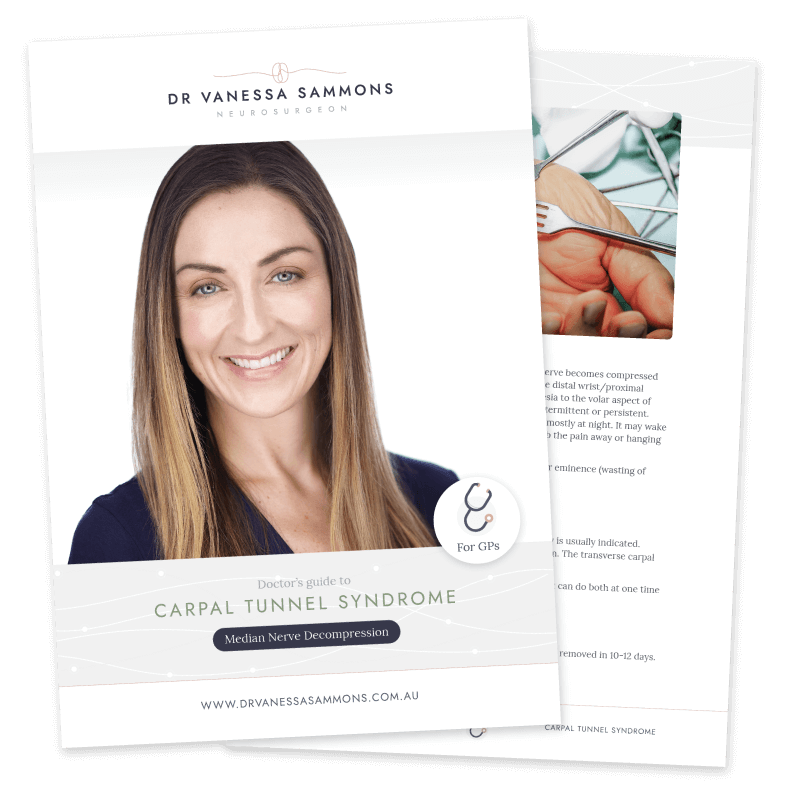What is the Carpal Tunnel?
The carpal tunnel is a passageway in the wrist. It’s comprised of the arching carpal tunnel bones and the ligament connecting the pillars of the arch. It houses the median nerve and tendons that connect the fingers to the muscles of the forearm. The median nerve is a conduit for sensation from the thumb, index, middle and ring fingers of the hand.
What Is Carpal Tunnel Syndrome?
Carpal Tunnel Syndrome (CTS) occurs when the ligament thickens over time, or when swelling or a change in the position of the tissue within the carpal tunnel compresses and irritates the median nerve. It can affect one or both hands.
What are the Symptoms of Carpal Tunnel Syndrome?
“Carpal tunnel syndrome symptoms usually start gradually,” reports the Mayo Clinic. Compression of the median nerve in the carpal tunnel can cause:
- Weakness when gripping objects with one or both hands
- Pain or numbness in one or both hands
- Pins and Needles feeling in the fingers
- Swollen feeling in the fingers
- Burning or tingling in the fingers, especially the thumb, index and middle fingers
- Pain or numbness in the hand and up the arm that is worse at night, interrupting sleep
What Causes Carpal Tunnel Syndrome?
Carpal tunnel syndrome is extremely common and occurs only in adults. The Canadian Centre for Occupational Health and Safety identifies more than a dozen occupations where repetitive motions may lead to CTS. Additionally, common contributors to carpal tunnel syndrome include:
- Arthritis
- Diabetes
- Gender (women are three times more likely to develop CTS)
- Hereditary factors
- Hypothyroidism
- Obesity
- Overuse
- Pregnancy
- Tendon inflammation
- Trauma such as a wrist fracture
- Diseases including amyloidosis, leukaemia, multiple myeloma, and sarcoidosis can cause the deposit of substances in the carpal tunnel, which leads to nerve irritation, and CTS. For most patients, however, the origin of their carpal tunnel syndrome is unknown.
When Should I Consult a Doctor?
You should definitely see a doctor when you have symptoms of carpal tunnel syndrome that interfere with your normal activities and sleep patterns. Early diagnosis is important. If you are concerned that you might have carpal tunnel syndrome symptoms, it is never too early to seek advice from your doctor.
How Is Carpal Tunnel Syndrome Diagnosed?
Early diagnosis and treatment are critical in stopping CTS from causing permanent damage to the median nerve. Non-invasive tests may include:
- Physical examination
- Routine lab tests
- Electro-diagnostic tests
- Imaging such as MRI, ultrasound or Xray Testing is used to identify the cause and severity of CTS so that an appropriate treatment plan can be developed.
How is Carpal Tunnel Syndrome Treated?
Early treatment of carpal tunnel syndrome can limit or even reverse the condition. Non-surgical options include:
- Wearing a splint
- Physiotherapy
- Refraining from symptom-generating activities
- Injections of cortisone into the wrist
When carpal tunnel syndrome persists, symptoms are sufficiently bothersome or there is weakness, the most appropriate management is a median nerve decompression. This involves a cut on the heel of your palm and then division of the transverse carpal ligament that overlies the nerve. CTS surgery can be performed using local anaesthesia with some sedation to keep patients comfortable. Surgery does not require an overnight stay. You will need to return to your doctor in 10-12 days to have your stiches removed, however.
What Can I Expect After Carpal Tunnel Release Surgery?
After surgery, you will:
- Have your vitals checked by a nurse to ensure there were no complications
- Have your wrist bandaged to combat swelling
- Have the bandage stay on and dry for 4 days
- Driving is not permitted on the day of surgery
What Should I Do After Surgery?
After you return home, you can use your hand and do whatever is comfortable. You should also:
- Keep your hand elevated as much as possible for the first 24 hours
- Avoid lifting and sporting activities for 4-6 weeks post-surgery
- Exercise your hand gently If at any stage you see increasing redness or if your wound becomes swollen or more painful, see your doctor immediately.
Should I Follow Up with Dr Sammons after Surgery?
Yes. You should schedule a follow-up appointment with Dr Sammons 4-6 weeks after your surgery. This will be scheduled with you when you are called by the practice nurse in the week after surgery. Should you have any worries, Dr Sammons is happy to meet with you earlier to address your concerns. Does Carpal Tunnel Syndrome Come Back? Recurrence of carpal tunnel syndrome following treatment is rare. Some residual numbness is possible in severe cases. Please call our rooms if you have any concerns or questions.
